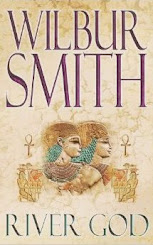What’s important to me is that people read the books and enjoy them, and that, at some point in there, the book was bought by someone. And that people who like things, tell other people. The most important thing is that people read.
Pulitzer-winner [Geraldine] Brooks "has never written a bad book", Sian Cain boldly proclaims in The Guardian:
The most confounding thing about Geraldine Brooks’s writing is how consistently good it is ... every book is remarkable. Working as a journalist did not beat the poet out of her – Brooks’s fiction is frequently beautiful, poetic at times, packed full of sentences to relish aloud – a river of “water as unlike our clear fast-flowing freshets as a fat broody hen to a hummingbird” in March; the hero who “walked through the woods like a young Adam, naming creation” in Caleb’s Crossing.
Cain also suggested five of Brooks's books for beginners and doubters to start with. Incidentally, someone reviewed Brooks's Foreign Correspondence some time back and seemed impressed with it. Might be a while before I can give Brooks's books a shot, though.
Ten things about Marco Ferrarese, novelist (Nazi Goreng), travel writer (Banana Punk Rawk Trails) and musician, in The Malay Mail Online. Have a taste (emphases theirs):
As a child with a stammer problem, I was very lonely and got easily attracted to horror films. They helped me feed my anger. The covers of early Iron Maiden albums that arrived from England were horror, too. I loved how Eddie held that pickaxe on the cover of Killers. My parents hated it, of course, which was another great reason to go for it.
...English is my second language and requires more attention and editing, but I know that almost everything I write in English will get published. On the other hand, Italian is a much richer language, as we have adjectives, expressions and shades of meaning that you can’t recreate in English. But most of what I write in Italian remains unpublished, because there’s no interest nor money for writers in Italy.
Also:
- In a restructuring exercise, British education publisher Pearson plans to axe 4,000 jobs. The AFP report picked up by The Malaysian Insider states that "Pearson has been hit hard by a difficult education market in the United States, where fewer people are going to university, instead seeking to go straight into employment in a buoyant jobs market. It has also been impacted in the UK as high costs have seen fewer students take vocational courses."
- "...bookshops are portals ... a good bookshop shows us what we didn’t know we wanted." Bookseller and author Jen Campbell on the magic of bookstores and how important that magic is to children.
- The e-book industry is in a state of decline, apparently. I guess it's harder to treat more expensive and bulky paper books as throwaway items, unlike digital files, which you can hoard till kingdom come.
- Celebrated sci-fi author Zen Cho will be holding court in Kinokuniya KLCC on 13 February 2016, from 11am to noon. Drop by and say "hi". Maybe buy a book. And get your copy signed.
- Some weeks back, an online hailstorm erupted over a supposedly lewd passage in a school-syllabus novel, Pantai Kasih (Love Beach), said to be a sex scene. The novel is not about beaches but a private hospital for VVIPs. Khairul Nizam Bakeri, author and social media editor for ASTRO Awani, read the book first and here's what he found (in Malay). In short: not lewd.
- A Snow White book based on the Disney adaptation was removed from a school library in Qatar for its "indecent" illustrations. What, more "indecent" than the Gulf nations' poor record in its treatment of migrant labourers?
I've dropped the ball for a bit to write up my recent trip to Melaka with several others, which would turn out to be the longest writing project of my life so far at almost 10,000 words. A shame I didn't take enough good pictures for it.
Categories:
Book Marks















